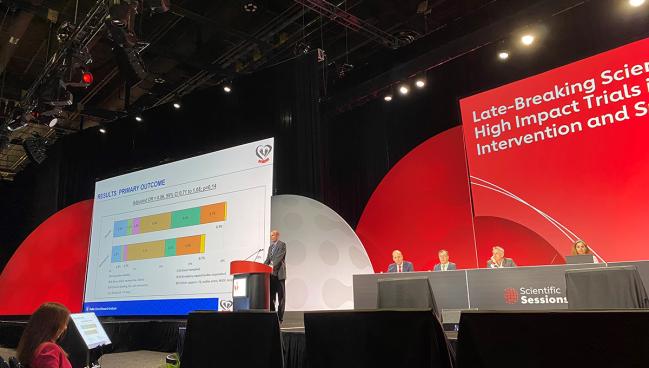STRESS Shows ‘Borderline Results’ for Methylprednisolone in Infant Cardiac Surgery
The trial, which missed its primary endpoint, hints at benefits for certain subgroups, so some plan to keep using the steroid.

CHICAGO, IL—Methylprednisolone used during pediatric cardiac surgery did not significantly reduce the primary endpoint of death, heart transplantation, or major complications in the randomized STRESS trial, but did lead to an increased risk of hyperglycemia requiring insulin.
Still, amid these disappointments, researchers found some reasons for hope that the steroid could still play a useful role.
With a lack of data in this space due to in part to the difficulty and cost associated with performing pediatric surgery trials, it is not surprising that practice is mixed, said Kevin D. Hill, MD (Duke University Medical Center, Durham, NC), who presented the findings during a late-breaking clinical trial session at the American Heart Association (AHA) 2022 Scientific Session.
Registries show perioperative corticosteroids were used in 52% of neonatal surgeries between 2011 and 2016, Hill pointed out. “It reflects that nobody really knows what the answer is,” he said. “I hope that the trial sheds some light on that.”
While the trial, which was conducted within the Society of Thoracic Surgeons (STS) Congenital Heart Surgery Database, did not meet its primary endpoint, Hill said their results showed enough of a “signal to suggest a small benefit from steroids, and so in talking with our surgeons I suggest that they'll continue to use them. But I do think that there is a potential to use them in a more-targeted fashion.”
The subgroups Hill most thinks will benefit are patients undergoing lower complexity operations and those with longer bypass times, whereas he would avoid steroid use in infants born prematurely and those prone to hyperglycemia.
Commenting on the STRESS results during a press conference, Larry Allen, MD (University of Colorado, Aurora), agreed. “Such borderline results in medicine are common and can be challenging to implement, but I would suggest that the use of steroids, based on this study, seems reasonable,” he said. “It also suggested that forgoing steroids in certain infants seems reasonable. . . . This is an impressive and unique database that they've created, and I expect that there will be much more knowledge to come as the STRESS Network investigators unpack the totality of this data.”
Hints of Benefit
For the study, which was simultaneously published in the New England Journal of Medicine, Hill and colleagues randomized 1,200 infant patients undergoing cardiac surgery (median age 126 days) to receive perioperative methylprednisolone or placebo.
The adjusted risk of the primary ranked composite outcome of death, heart transplantation, or 13 major complications was not different between the study and control groups (adjusted OR 0.86; 95% CI 0.71-1.05). However, the unadjusted analysis (OR 0.82; 95% CI 0.67-1.00) and win ratio analysis (OR 1.15; 95% CI 1.00-1.32) of the primary outcome favored methylprednisolone use, as did the endpoint of bleeding requiring reoperation (OR 0.34; 95% CI 0.14-0.81).
Notably, patients receiving methylprednisolone had higher postoperative blood glucose, were more likely to need postoperative insulin, and were less likely to receive postoperative hydrocortisone (P < 0.01 for all).
In subgroup analyses, there were trends that patients with less complex surgeries, longer bypass times, and who were not born prematurely were potentially more likely to benefit from perioperative methylprednisolone. Additionally, the researchers noted no site-dependent treatment effects nor patient differences with regard to race, ethnicity, gender, preoperative risk factors, noncardiac anatomic abnormalities, or chromosomal anomalies.
While similar pediatric cardiac surgery trials would cost about $13 million to conduct, Hill reported that they were able to run this study with a total cost of only $3 million, or $2,400 per patient enrolled. This is because they designed their trial within a preexisting registry database.
When discussing the data with his team, Hill said that their statistician advised them to “look at the totality of data and not pay so much attention to P values,” he said. “So that's what we did. I think the consensus of the investigative team was that steroids offer a small benefit when you look at the totality of the data. So, we recommend continuing to use steroids, but I think every institution is going to have to take a look at the data itself and make their own decision since it was a bit of a mixed result in the end.”
Hill added that “future studies should evaluate mechanisms for risk stratification to elucidate whether a more-targeted approach might offer benefit in selected subpopulations.”
‘Pragmatic’ Design
Allen congratulated the researchers on their “pragmatically designed study” that enrolled a “really amazing” number of patients.
Additionally, Stephanie Fuller, MD (Children’s Hospital of Philadelphia, PA), who discussed the findings during the AHA session, called the STRESS trial “the first of its kind.” In creating an ancillary database for their research question, Hill and colleagues potentially opened the door for using such a model for other clinical dilemmas in the future, she added.
Hill also lauded the researchers for their “economization of time, effort, and cost” especially in enrolling such a challenging and vulnerable population. “This is truly the future of pediatric randomized trials,” she said.
Until now, Fuller explained, steroids have typically been administered for low cardiac output syndrome, but “neither the threshold for the use of steroids nor the use of insulin to treat hyperglycemia has been standardized. [The study] does raise the question of whether or not further standardization and protocolization of these therapies would be beneficial.”
Hill specified that the hyperglycemia observed in the trial was transient, typically only occurring within the first 72 hours of surgery. “We see a lot of hyperglycemia, period, as a stress response to surgery,” he said. “The blood glucose levels were in the 200s for the methylprednisolone group, so high, but not extremely high. This is a known side effect of steroids. . . . It's probably dose dependent, and we're using a relatively high dose of steroids for this trial.”
The potential implications of such hyperglycemia include increased infection risk and fluid overload, neither of which were seen in STRESS, Hill said, although he’d like to see future studies look at the effects of lower doses of steroids. “So long story short, this is transient hyperglycemia in the moderately elevated range. I don't see it as a factor that is prohibitive to the administration of steroids,” he concluded.
Yael L. Maxwell is Senior Medical Journalist for TCTMD and Section Editor of TCTMD's Fellows Forum. She served as the inaugural…
Read Full BioSources
Hill KD, Kannankeril PJ, Jacobs JP, et al. Methylprednisolone for heart surgery in infants — a randomized, controlled trial. N Engl J Med. 2022;Epub ahead of print.
Disclosures
- STRESS was supported by grants from the National Centers for Advancing Translational Sciences of the National Institutes of Health, the Eunice Kennedy Shriver National Institute of Child Health and Human Development of the NIH, the Trial Innovation Network, and the Pediatric Trials Network.
- Hill reports no relevant conflicts of interest.




Comments